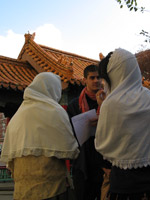Engaging the Culture Archives
Refugees for a Day

“What did you learn?”
The question hangs in the air as 15 Seattle Pacific University students consider the day they’ve spent learning firsthand about refugees and their experiences.Owen Sallee, the coordinator for SPU’s Urban Involvement (UI) program, continues: “And what are you thinking now?”
The daylong student event, held November 10, 2007, was part of the Refugee Project, a program co-sponsored by World Relief and UI. Held twice each academic year, the Refugee Project gives students a chance to put theory into practical experience.
“It is an opportunity for students to experience ‘engaging the culture, changing the world,’” says Sallee. “Students attend a presentation about refugees, participate in a simulation, and then eat dinner with recently arrived refugee families.”
"Walking a Mile in Their Shoes"
Both the presentation and simulation occurred in Seattle’s International District. Students started the day learning about what it means to be a refugee, how refugee camps work, and the roles of aid workers at those camps.“Refugee status allows special services,” says Andrew Hays, student coordinator for the Refugee Project and a sophomore sociology major. “But it’s a hard classification to get. And aid workers are often prejudiced against refugees.”
Examples of the types of prejudice that refugees face came out during the interactive simulation that followed the presentation. During the simulation, SPU students were separated into three “families” from Afghanistan, Burma, and Somalia. The participants were dressed in traditional clothing, assigned roles as family members, and given stories about their history to memorize. Next, the students visited stations that represented different refugee services.
“We were really surprised how they treated us,” says Lindsey Killebrew, a freshman majoring in Latin American studies and a member of the simulation’s Afghan family. “At the feeding station we were treated like criminals trying to steal.”
Often students visiting the medical clinic were treated like they were stupid, and both Hays and Killebrew noted that the U.S. State Department workers looked for any reason they could find to keep the refugees out of the United States.
A Taste of Reality for Dinner
While the simulation gave SPU students a taste of the refugee experience, dinner at the end of the day with refugee families living in Kent, Washington, made the situation real.“I ate with a widowed Somali Bantu father and three of his sons — ages 4 to 15,” says Hays. “His other three kids are still in the refugee camp. He was really open to discussing his pain and what he’s gone through.”
Killebrew, who ate with a Burmese family, says she was impressed by how joyful they were. “It’s hard to believe, considering some of the horrors they’ve seen,” she admits. “Plus, they had to leave their daughter behind. Meeting them has put an entirely different perspective on refugees for me.”
That kind of feedback, says Sallee, helps him see the benefit of the Refugee Project. “The program exposes students to issues faced by immigrants and refugees. For some students, it even causes them to switch their career interests.”
“The program opened my eyes to a whole group of people that needs to be served,” says Killebrew. “And they’re right in my own back yard.”
 For more information about this event, check out the Refugee Project video on SPU’s iTunes U site.
For more information about this event, check out the Refugee Project video on SPU’s iTunes U site.
Return to Engaging the Culture Archives


